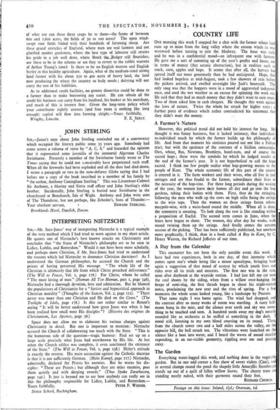A Farmer's Nature However, this political trend did not hold
his interest for long. lie thought it was funny business, but it lacked intimacy, that individual- to-individual touch by which the farmer builds up his philosophy of life. And from that moment his statistics poured out not like a Fabian tract, but with the opulence of the contents of a Sicilian cornucopia. Oats, wheat, flax, Newtons, Bramleys, hazel-nuts, and of course the sacred hops ; these were the symbols by .which he judged results at the end of the farmer's year. It is not hyperbolical to call the hops sacred. I think too few people realise what hop-growing means to the people of Kent. The• whole economic life of this part of the county is centred in it. The farm workerS and their wives, who all live in tied cottages and are thus feudal to the farmer, subordinate their lives to the necessity of the hop-vine. For three long periods during the waxing of the year, the women leave their homes all day and go into the hop gardens, taking their babies with them. First, they do the stringing, following the men who walk up the rows on high stilts fixing the strings to the wire tops. Then the women on these strings fasten others, maypole-wise, with a waist-band round the middle. When all is done, the symmetry is amazing. To look along the row is like standing within a proposition of Euclid. The second term comes in June, when the bines have begun to shoot. The women, day after day for weeks, walk round twining them up the strings. And finally comes the autumn session of the picking. That has been sufficiently publicised, but nowhere more graphically, I think, than in a book called A Boy in Kent, by C. Henry Warren, the Richard Jefferies of our time.


























 Previous page
Previous page